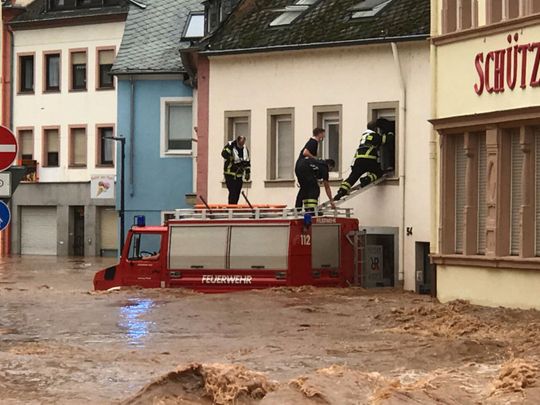
BERLIN: Devastating floods swept through swaths of Europe on Thursday, killing at least 46 people and leaving dozens more missing after buildings collapsed and cars were swept away amid unusually heavy rainfall.
At least 42 people died in Germany, by far the worst hit country, as rivers burst their banks, buildings collapsed and entire villages were cut off from rescuers.
Four more were killed in the Belgian city of Verviers, prompting prime minister to appeal for international aid. Severe flooding also impacted the Netherlands and Luxembourg, with warnings also issued in France.
German Chancellor Angela Merkel, who is due to meet President Joe Biden during a visit to Washington on Thursday, said she was “shocked” at chaotic scenes from flooded areas and offered sympathy to the families of those dead and missing.
“To the many tireless helpers and emergency workers, I thank you from the bottom of my heart,” she said.
Entire villages were cut off from rescuers by flooding, while others were evacuated amid fears that dams would burst. More rainfall is forecast in southwestern Germany later this week.
Police said at least 18 people died in the district of Ahrweiler, in the western German state of Rhineland-Palatinate, after the river Ahr, a tributary of the Rhine, flooded. Earlier in the day, the local police had said that as many as 50 residents were trapped on the roofs of their homes awaiting rescue.
Six buildings collapsed, as authorities warned more were at risk of doing so. Police created a hotline for residents to report those missing. “The consequences are devastating, and our first priority is still to save lives,” Jrgen Pfhler, the county commissioner of the district said at a news conference. “All our efforts are concentrated on that.”
‘This is not the new normal’
The neighbouring state of North Rhine-Westfalia was also hard hit. The army deployed tanks and trucks to the city of Hagen to clear roads of rubble and debris. Three bridges were destroyed, according to police.
Two firefighters sent to assist those trapped by rising waters in the Sauerland region died this week, according to news agency DPA.
The country’s biggest power distribution company, Westnetz, estimated Thursday that around 200,000 homes were without electricity as a result of the widespread flooding.
On Wednesday, the German weather service issued an extreme weather alert - a warning that environmental expert Bernd Mehlig said was “completely unusual in summer.”
Steffen Seibert, a spokesman for the German government, said the severe flooding was “terrible” and pondered its link to climate change.
“Even though not every event, not every flooding or local incident, is related to climate change, many scientists tell us that the frequency, the intensity and the regularity with which this happens is a consequence of climate change,” he said, according to the Associated Press.
On social media, many shared photos of rising waters, while local police used the platforms to urge onlookers not to block vital escape routes.
Climate activist Greta Thunburg, also shared videos of the floods. “This is not ‘the new normal’,” she wrote on Twitter. “We’re at the very beginning of a climate and ecological emergency, and extreme weather events will only become more and more frequent.”
Earlier this week in Britain, flash floods sparked widespread travel chaos, with parts of London experiencing a month’s worth of rain in just one day. Locals were evacuated and cars became trapped as floodwaters continued to rise.
Switzerland also issued travel and weather warnings this week as heavy rainfall and thunderstorms brought flooding to the city of Zurich.
“I went out for a walk in the early morning and the rain just didn’t stop. There were huge trees that had been brought down in the night, it was really scary,” one local told Reuters.








